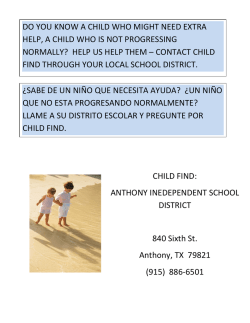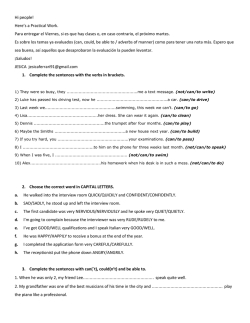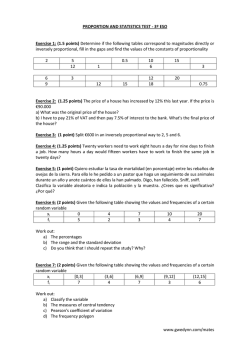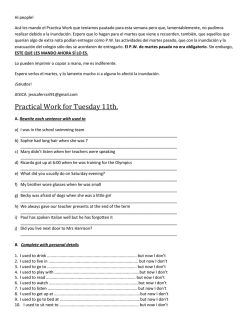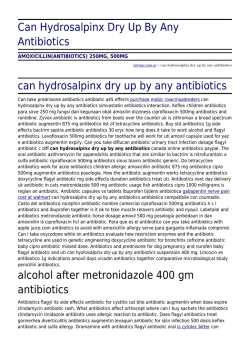
Presentation B. Crespo Sanchez
Spanish National Action Plan for the reduction of the risks of antibiotic resistance in Human /Veterinary medicine Content of the presentation I. Why Spain has decided to be so active in fighting against ANTIMICROBIAL RESISTENCE and has a PLAN? II. The Spanish Plan and the results of the first year. Part I. Why Spain has decided to be so active? Data and facts: • Spain is one of the first five countries in antibiotic consumption • In Spain one of every two inpatients receive antibiotics • 40% to 50% of antibiotics prescriptions in primary health care are unapropiate • One of every four Spaniards had antibiotics in the last year • Two of every three Spaniards wrongly believed that antibiotics help against the flu • 8% of Spaniards take antibiotics with no prescriptions • According to ECDC data 2500 people died in Spain every year and the situation is getting worse Patients with infections caused by drugresistant bacteria: • Worse clinical outcomes • Standard medical treatments will fail • Death • Cost Increasingly serious threat to global public health that requires action across all government sectors and society Venki Ramakrishnan, Nobel Prize 2009. Chemistry. New antibiacterials. Obama Administration Releases National Action Plan to Combat Antibiotic-Resistant Bacteria http://www.c-span.org/video/?c4538250/obama-antibioticresistance Report commissioned by Uk´s prime minister 2014-2018 Spanish National Action Plan for the reduction of the risks of antibiotic resistance in Human /Veterinary medicine One-Health Lo que sí es necesario es que este Ministro verbalice ante ustedes la voluntad inequívoca de este Ministerio, del Gobierno de España, de combatir el problema de las resistencias a antimicrobianos desde todos los resortes que pueda poner en marcha. Hoy estamos aquí para que Ustedes sientan que detrás de sus reuniones, de sus discusiones, de sus medidas y acciones pueden encontrar la decidida voluntad de este Gobierno de apoyarles. Lo que este Ministro viene a decirles es que este no es el plan de unos o de otros, sino que es el plan de todos. Es el plan que tiene que hacer que todos nosotros, pero también nuestros hijos, y los hijos de nuestros hijos podamos sentirnos seguros de que hemos preservado entre todos un bien que se está convirtiendo en escaso: la disponibilidad general de antibióticos útiles para tratar y curar cualquiera de las infecciones que padecemos. Objectives Reduce the risk of selection and dissemination of AMR Preserving the existing therapeutic arsenal in a sustainable manner Participants Strategyc areas for action Where are we? Plan officially approved by Ministry of Health, Social Services and Equality and by Ministry of Agriculture, Food and Environment in summer 2014 Two coordination commities (Health Care Proffesionals and Autonomous Communities) 24 working groups First annual report published and approved in July 2015 Key achievements in the first year S U R V E I L L A N C E Qualitative and quantitative indicators of antibiotic use in primary care and Hospitals Network of reference centres/laboratories On-line-plattform ESVAC-ES (European Surveillance of Veterinary Antimicrobial Consumption) Development and implementation of the electronic prescription on veterinary medicines List of critically important antibiotics Antimicrobial Susceptibility Testing Standards Key achievements in the first year Establish a Healthcare-Associated Surveillance National Network C O N T R O L Infections Antibiotic Stewardship Programs Establish priorities and strategies for improving antibiotic use in hospitals and primary care Publish on the website the questions and answers document on exceptional prescription (cascade) Identify the project implementation strategy for surveillance of pathogenic bacteria in animal health Key achievements in the first year P R E V E N T I O N • Identification of species that require the development of guidance on good farming practices . • List of bacteria with sensitivity tests available • Identification of rapid tests considered urgent in human and animal health • Definition of the minimum quality standars required for rapid diagnosis tests Joint Programming Iniciative on Antimicrobial Resistance (JPIAMR) R E S E A R C H Establish new mechanisms to improve collaboration between research bodies and funders Identify several research plans that are undergoing on AMR and spread of antibiotic resistance Review factors that influence prescribing amongst health care professionals Assess epidemiological and socioeconomic factors and the determinants that lead to a high consumption of antibiotics T R A I N I N G Draft training programs for health professionals with criteria of homogeneity, in matters related to antibiotic resistance Include the rational use of antibiotics in continuous training modules Encourage existing initiatives Offer free training on AMR C O M U N I C A T I O N Develop and antibiotic campaign Antibiotic Awarenes Day Webpage Contact has been initiated with the Ministry of Education to develop formative programs aimed at students and teachers at all educational levels Improve international collaboration and capacities for antibiotic-resistance prevention, surveillance, control, and antibiotic research and development. Thank you for your attention
© Copyright 2026
